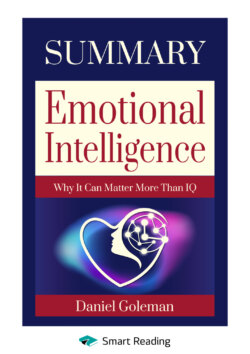Читать книгу Summary: Emotional Intelligence. Why it can matter more than IQ. Daniel Goleman - Smart Reading, Ольга Ганкова - Страница 3
Anatomy of Emotions
ОглавлениеOne of the most popular themes in science fiction works often envisages that people will someday become enslaved by artificial intelligence. At first glance, it seems that this is possible: after all, a computer is already "smarter" than a human and can perform highly technical operations in a fraction of a second, a speed that is unattainable to the human brain. However everything is not so clear-cut. Scientists have succeeded in proving that almost all people make all their decisions not on an intellectual, but rather on an emotional level.
Once in the US state of Louisiana, a terrible tragedy occurred: a railway bridge collapsed under a train and the cars, filled with passengers, crashed into the river. The parents of wheelchair-bound 11-year-old Anna Chauncey managed to push their daughter out of the sinking car at the last second, as a result of which she escaped. However, they were not so lucky. This act of parental selflessness needs no explanation from a human point of view, but what is it dictated by, if not emotions? After all, the logical question becomes, is the life of one disabled person more valuable than the life of two able-bodied people.
However, this topic is not only relevant in the personal realm, but also very much so in the professional sphere. An analysis of the neural connections of the brain and the sequences in which they begin to act shows us that any decision has an emotional tint. But very often, especially when it comes to work, we are not aware of the emotional component and believe that we are acting purely rationally.
When we sign a contract with a business partner, we activate the same centers in our brain as if we are choosing a restaurant for our first date.
All our lives, albeit unconsciously, we are guided by emotions. That is why it is so important to study them and understand how to manage them.
For those who are skeptical it will be useful for them to conduct the following experiment: imagine two people, one of whom is completely devoid of emotional intelligence, but at the same time has a very high intelligence quotient (IQ), and a person who has no analytical skills, but who has a feel for others, has a high level of empathy and is able to establish interpersonal relationships. Which of them will succeed in life? The answer is obvious: a human-robot, no matter how highly intelligent it may be, can never become an effective leader or a good partner. But an emotionally gifted person will always be able to establish contact with and organize others, even those who are more intellectually developed, while understanding the feelings of his or her partner.
The amygdaloid body, or amygdala, the area of the brain located in the temporal lobe of the hemisphere, is responsible for the emergence of emotions. Humans have two amygdalae, one in each hemisphere.
The amygdala is a kind of alert system for the brain, an emergency signal that activates the rest of the brain’s reactions. A person deprived of amygdalae completely loses contact with the outside world and can neither feel his own emotions nor perceive the emotions of others.
Doctors once attempted to cure a patient’s nervous attacks by removing his amygdalae. As a result of the operation, the person, although he did not lose the ability to communicate and interact with people, he completely ceased to be interested in them, did not recognize either friends or relatives, and was absolutely indifferent to their suffering.
The brightest manifestations of the function of the amygdalae are those moments in our lives that we later regret the most.
A young woman came from out of town to spend her day off with her boyfriend. Over dinner he gave her a gift that she had long dreamed of receiving. However, immediately afterward, he said that he could not spend the whole day with her, as he had to go the gym. The girl was so offended and disappointed that she ran out of the restaurant and on the way to her car threw the gift into the trash. A long time after the quarrel had passed and after the girl had completely calmed down, she most regretted not the quarrel itself, but rather that she had thrown away the gift, an impulsive act she was unable to explain.
At moments similar to those described above, people begin to be guided by their most primitive impulses. These impulses release physical, hormonal responses and activate the cardiovascular system, limb muscles and instincts. In other words, we turn into our primitive ancestors: our body prepares to either fight or flee, our sense of smell, hearing, and sight become more acute, and our heart rate accelerates.
